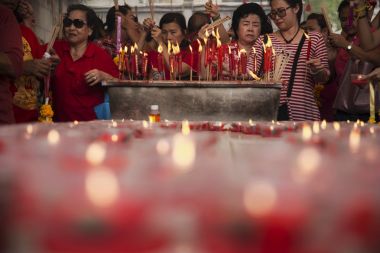Incensed: Thai health ministry issues joss stick warning

Thailand's health ministry has urged people to stop lighting joss sticks and placing them near ritual offerings of food during Chinese New Year, warning that consuming the food could cause cancer.
Joss or incense sticks are burnt by the faithful during religious rituals in Asia, and are common in the run-up to the Lunar New Year, which begins on Thursday.
The public health minister said on Wednesday the consumption of food exposed to incense ash could lead to heavy metal poisoning, but he stopped short of banning the tradition.
"We are trying to cut the risk to worshippers by issuing guidelines to make people aware that lighting joss sticks and paper during the Chinese New Year could have serious health effects," Rajata Rajatanavin told Reuters.
The Lunar New Year is not a holiday in Thailand, but many ethnic Chinese, who make up about 15 percent of the country's 67 million population, take time off to be with family.
Many Buddhists believe that the incense from joss sticks serves as an aid to prayer and helps worshippers commune with deities and departed souls.
But Rajata said a ministry study found that incense smoke contained carcinogens such as butadiene and benzene.
Hatthai Dechatrakul, the daughter of Chinese immigrants, said the custom of burning joss sticks could disappear anyway.
"Aunties and grandmothers burn incense, young people not so much," said the 58-year-old, lighting a joss stick at the Wat Mangkon Kamalawat temple in the heart of Bangkok's Chinatown.
"They are less and less tied to tradition."
Rajata said he wanted people to put out joss sticks after they use them.
"It cuts the risk to their health and also helps avoid fires," he said.











